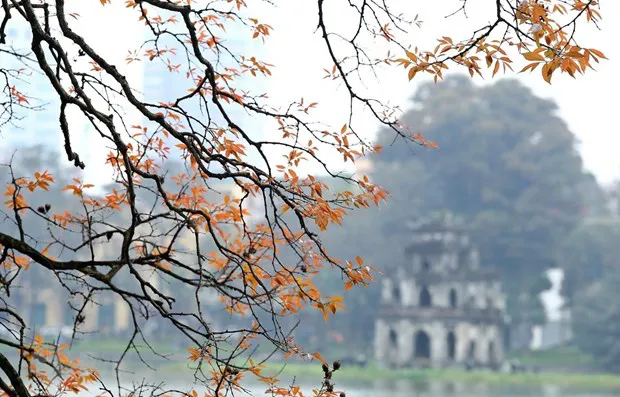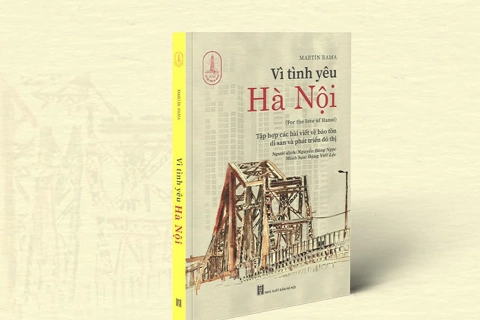For the Love of Hanoi: Emperor Le Loi’s legacy
In late February 2019, US President Donald Trump and North Korean leader Kim Jong-Un met in Hanoi to discuss nuclear disarmament and peace on the Korean Peninsula.
During two intense days the world’s media attention was focused on this high-level meeting, whose outcome was expected to shape geopolitics for decades. And while the outcome was disappointing, thanks to this meeting Hanoi acquired a new global standing.
| Hoan Kiem Lake in Hanoi. Photo: VNA |
The world already knew about Hanoi, of course. Millions of tourists visit the city every year to enjoy its vibrancy and its charm. Its sidewalk life, its delicious cuisine, its elegant French buildings, its beautiful lakes… are a magnet for people from all around the world. And many of those who visit fall for the city. Including me! I visited Hanoi for the first time two decades ago, I lived there for eight years while I served as the lead economist of the World Bank for Vietnam, and I keep returning to Hanoi as frequently as I can. Twenty years later I have no doubt that I am still totally in love with Her.
Yet, for decades Hanoi was isolated from the world. There were few embassies, almost no tourism, no exposure to international debates, and very few opportunities to travel abroad. It was only with Doi Moi that the city started opening. One of the guiding principles of Doi Moi was for Vietnam to become friends with all countries. It is telling that President Trump was welcomed by Hanoi as a friend from a respected and admired country, much the same as Presidents Clinton and Obama were welcomed before him.
Hanoi’s stature as the venue of high-level international meetings has grown gradually, but steadily, since the time of Doi Moi. In recent years the city has hosted major events related to ASEAN, the Asia-Europe Meeting, or the World Economic Forum.
A milestone in that process was the convening by the Government of Vietnam and the World Bank, of the Consultative Group meetings. On their occasion, at the end of every year, representatives from all the countries and multilateral organizations providing development assistance to Vietnam would get together to discuss the progress made, the needs and the challenges.
A first Consultative Group meeting for Vietnam had been organized by the World Bank in Paris, in 1995. But the 1997 decision to hold the meeting in Hanoi, with the Government as a co-chair, created a global precedent. Up to then, similar meetings for other developing countries had always been held in advanced economies, often in the capitals of their former colonial powers. In the following years, Hanoi’s precedent became the norm.
I feel privileged that I could participate in all the Consultative Group meetings for Vietnam while I lived there. These meetings were an extraordinary opportunity to candidly exchange information and ideas with the leaders of the country, the business community, and civil society organizations. Such willingness to consider different viewpoints and to find better solutions together is, no doubt, the most important ingredient for any meeting to be successful.
That kind of openness is also what makes a city attractive as the venue of high-level international meetings. In a way, countries engage with the world through their most open cities. New York in the US, Paris in France or Shanghai in China are the international “connectors” for their countries. These are cities where business thrives, where innovation takes place, where ideas are debated, where artists create… The high-level meeting between President Trump and Chairman Kim in February 2019 was one more milestone in Hanoi’s journey to become a global connector too.
It may seem ironic to see countries coming to Hanoi to seek peace, when Hanoi itself was for so long at war. Almost exactly 40 years earlier a ferocious conflict erupted in the Northern Border, and it was feared that it could reach the nation’s capital at any time. Less than a decade earlier, at the end of 1972, Hanoi suffered 12 days of massive bombings. And in 1945, the turbulent liberation of the city marked Vietnam’s independence.
Some of the city’s most beautiful streets remind us that today’s peace took many centuries to be secured. Tran Hung Dao Street, where I lived during all my years in Hanoi, was named after the military commander who defeated invasion in the 13th century. Two streets away, the name of the street honors the courage of the sisters Trung, who bravely fought occupation in the 1st century.
But peace is also Hanoi’s vocation. Few would dispute that Hoan Kiem Lake incarnates the soul of the city. There, in 1428, the lake’s giant turtle surfaced and grabbed the sword of emperor Le Loi out of his hands, taking it deep into the water to make him understand that the time for battles had ended. A long cycle of peace and prosperity followed. If this story were to happen today, the sword would have to be replaced by nuclear weapons. And if they could be made to disappear, like emperor Le Loi’s sword, the giant turtle would feel proud to see Hanoi become, once again, a city for peace.
The story is part of the book For the Love of Hanoi by Martin Rama - an economist working for the World Bank.
Martin Rama is known to many Vietnamese for his book Hanoi Promenade, which won the Bui Xuan Phai Award - For the Love of Hanoi in 2014. Almost a decade later, Martin Rama has published his second book on Hanoi. Taking its title from the Bui Xuan Phai Award, the book shows Martin Rama's ever-growing love for the city, from being enchanted while strolling through Her - as he affectionately calls Hanoi - to being deeply committed to it.
His second book about Hanoi - For the Love of Hanoi - will be officially released on July 29, 2023.












